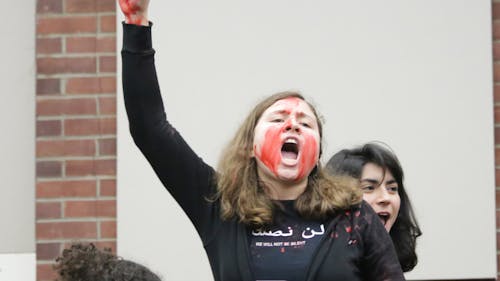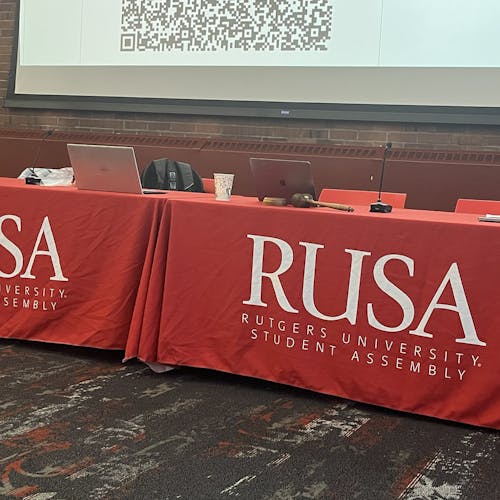Rutgers students protest journalist Milo Yiannopoulos's visit to campus

While journalist Milo Yiannopoulos spoke about the myth of the wage gap and the pitfalls of feminism, student protestors in the audience at Scott Hall stood up and smeared fake blood on their faces in opposition.
About 50 students sat in the audience to protest Yiannopoulos's University visit, which kicked off his “Dangerous Faggot” tour. Yiannopoulos, senior editor at conservative news site breitbart.com, is known for his controversial statements about feminism, race and political correctness.
After screaming, “This man represents hatred,” an anonymous female student smeared what appeared to be blood over her face and arms. About 10 others soon followed, and then left the room together. Roughly 40 protestors stayed for the remainder of the event.
"We must, unlike the Left, engage in the other side of the argument," Yiannopoulos said. "I noticed that when they were asked questions, they left the room."
A number of shouting matches and profane exchanges between audience members occurred throughout the event. Some audience members responded to the protestors by chanting, "Trump."
Nyuma Waggeh, a School of Arts and Sciences junior and one of the protestors, believes Yiannopoulos's comments cross the line between hate speech and free speech.
“Freedom of speech is a responsibility,” Waggeh said. “You should use your privilege to be responsible for one another. Be conscious of what you speak, because a lot of people could take your message wrong.”
Yiannopoulos's offensive rhetoric can be found across his Twitter, which was recently unverified for seemingly political reasons. Just one example of his many controversial tweets includes, "Feminists want to do away with gender pronouns in that they’re all so disgustingly fat no one can tell what sex they are anyway.”
Throughout the event, Yiannopoulos made similar comments.
"Even women are giving up on feminism because they realize it is a poisonous creed that is pushing people apart," Yiannopoulos said at the event.
The protest, organized by a collaboration of multiple student organizations such as social justice collective RU Speak Out, aimed to voice their concerns against comments such as these. Black Lives Matter Rutgers did not host, sponsor, or organize the protest in any capacity, according to a statement released by the group.
“(Rutgers groups) should not be inviting anyone like (Yiannopoulos) because what we stand for is inclusion and diversity,” Waggeh said. “If a speaker makes someone feel unsafe or uncomfortable, then they should not come to campus.”
Looking past individual tweets, Waggeh said “anyone who spews hate” should not speak on campus.
“Milo is a pawn in the system. What I want people to get out of this is to speak your voice,” she said. “If you have something to say, say it in moments of injustice like this.”
Matthew Boyer, president of Young Americans for Liberty's Rutgers chapter, disagrees.
Young Americans for Liberty invited Yiannopoulos to the school in order to expose students to opinions that do not align with their own, Boyer said.
In the past few years, Boyer said college students have been censoring ideas on campus that do not match their own liberal views. Such instances at Rutgers include the Condoleezza Rice protests in 2012 and the school’s restrictive “free speech zones.”
“No matter how provocative or taboo the speech may be, there’s still a value to that speech," said Boyer, a School of Arts and Sciences senior. “I think it’s really important to hear people come speak, even if you don’t agree with them.”
Boyer believes there is a hypocrisy in social justice movements, whose demonstrators want the freedom to protest racial inequality, but simultaneously want to quell opposing views using “safe spaces” and “trigger warnings.”
“If you’re a climate change denier, you might be upset that Bill Nye came and pushed climate change at your commencement. But those people weren’t protesting at your commencement,” said Boyer, whose own “trigger words” include Barack Obama and Hillary Clinton.
Opposition to Yiannopoulos does not stem from opposition to free speech, but to racism and sexism, said Egypt Pringley, a School of Arts and Sciences senior.
"Everyone is entitled to their opinions, but not everything he says is factual," Pringley said. "We say we are a research institution … and we are going to have this speaker come here who says flagrant things like the wage gap doesn’t exist or rape culture doesn’t exist."
Before the event, Boyer emphasized the question and answer portion of Yiannopoulos's talk as a way for students to get involved in the debate.
A number of protestors directed questions to Yiannopoulos during the event.
“If you have a question, come and formulate them, don’t just shout them out,” Boyer said. “That’s such an easy way out of the debate.”
Editor's Note: A previous version of this article implied that RU Speak Out was the sole organizer of the student protest when it was one of multiple organizers. The article has been edited for clarity.



